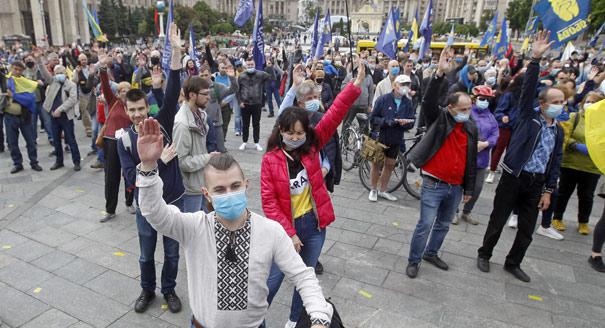The autumn has brought with it new problems for Ukrainian President Volodymyr Zelensky. The ceasefire established with difficulty in the Donbas is hanging by a thread, the crisis in Belarus has destroyed relations with Minsk, and former associates of Zelensky are among those waging war on the presidential team’s reputation. But the biggest difficulties of all look set to stem from the local elections that will take place at the end of October. The president’s party, Servant of the People, is losing popularity and does not enjoy strong representation in the regions, while the parliamentary and regional opposition see the local elections as an opportunity to take revenge against Zelensky for his landslide victories last year.
Ukrainians will head to the polls in October to elect city mayors and regional, district, and municipal council deputies, as well as the heads of the amalgamated hromadas (areas) created by the decentralization reform, which transferred authority and budget control from the center to the regions. Regional authorities are becoming far more influential, including financially: the overall value of regional budgets nearly quadrupled from 2014 to 2019, from 68 billion to 234 billion hryvnia (the exchange rate against the dollar slightly more than doubled during that time, from 11–13 to 26–28 hryvnia).
Local elections are a chance for Ukraine’s old political elite to exact payback against Zelensky for their humiliating defeat at his hands in last year’s presidential and parliamentary elections. Local problems with roads, hospitals, and other day-to-day issues have been put aside, while the focus is once again on the nationwide agenda.
In the country’s southeast, Yuriy Boyko and Viktor Medvedchuk’s Opposition Platform–For Life party slams Zelensky and his party for failing to bring peace to the Donbas and forcing the Russian language out of schools. In central and western Ukraine, former president Petro Poroshenko’s European Solidarity party accuses the president of giving up national interests to the Kremlin and persecuting patriots. Both ends of the political opposition will try to turn the regional elections into a referendum on people’s trust in Zelensky.
Despite those efforts, centrist voters are in no rush to transfer their allegiance en masse to Zelensky’s radical opponents. Polls show that more than a quarter of Ukrainians are still prepared to support Servant of the People candidates at elections for local councils. Medvedchuk and Poroshenko’s parties are polling 17 percent and 16 percent, respectively, but opposition voters are far more motivated than wavering Zelensky supporters to get out and vote.
To mobilize his followers, the president has toured the country, opening schools and hospitals and presenting regional development programs. Yet the effectiveness of these trips is dubious: last year, Zelensky’s visits to the regions looked like the actions of a confident young leader ready for change. Now they are uncomfortably reminiscent of the formulaic trips of his predecessors.
The upcoming elections have highlighted the numerous shortcomings of Servant of the People. It doesn’t have reliable representatives in the regions, the governors appointed by Zelensky are unpopular, and the party itself is unconsolidated and prone to internal conflicts. These differences within the party and lack of personnel mean that Servant of the People has no chance of winning mayoral elections in key centers. In cities in the southeast with a population of over 1 million, the incumbent mayors look comfortably set for reelection, barring a force majeure, and the parties and blocs loyal to them will take control of municipal councils.
These weaknesses are forcing the presidential party to reach compromises with the likely winners before voting has even taken place. A good example of this is Kiev, where Servant of the People has clearly decided not to challenge the incumbent mayor, Vitali Klitschko—who has an approval rating of over 40 percent—in the hope of later forming a union with his Ukrainian Democratic Alliance for Reform party within the new Kiev city council.
Servant of the People is frantically searching for candidates who might attract voters. The party continues to exploit the success story of Zelensky himself, a former comic actor, and views people from the world of show business as its potential reserves. But seeing that some of his former colleagues have already disappointed voters, Zelensky is increasingly choosing representatives of financial and industrial circles for his mayoral candidates. The time has come for the old elites to take their revenge.
Servant of the People’s dismal prospects in the regional elections demonstrate all too clearly how fleeting the “Zelensky effect” is. Having staked everything on changing faces rather than reforming institutions, he rapidly lost momentum, and with it, his popularity.
Officially, the presidential party’s situation is not that bad. It is likely to be able to form factions in most local councils, and has the potential to form regional coalitions. It also has good chances of winning mayoral elections in several secondary centers.
But for Zelensky’s team, which is used to winning landslide victories, the outcome of the elections will be dispiriting, and will fan the flames of internal strife. After all, success has many fathers, but failure is an orphan. This discord will continue to make headlines, creating an unsavory image of backstabbing and treachery around Zelensky, which will only damage the authority of the “people’s president” even further in the eyes of Ukrainians.
Victory in the elections will give the opposition a new foothold from which to put pressure on Zelensky, as well as opportunities for regional sabotage, enhanced by the increased authority given to local governments. That will be the beginning of new divisions and chaos within the country. Zelensky, who has previously said that mayors cannot be in opposition to the president, could find himself living in a new reality.
A poor result for Servant of the People will create a situation in which local elites distance themselves from the central authorities in Kiev, and smoldering discontent with time crystallizes into new protest leaders who are ready to march on Kiev.
